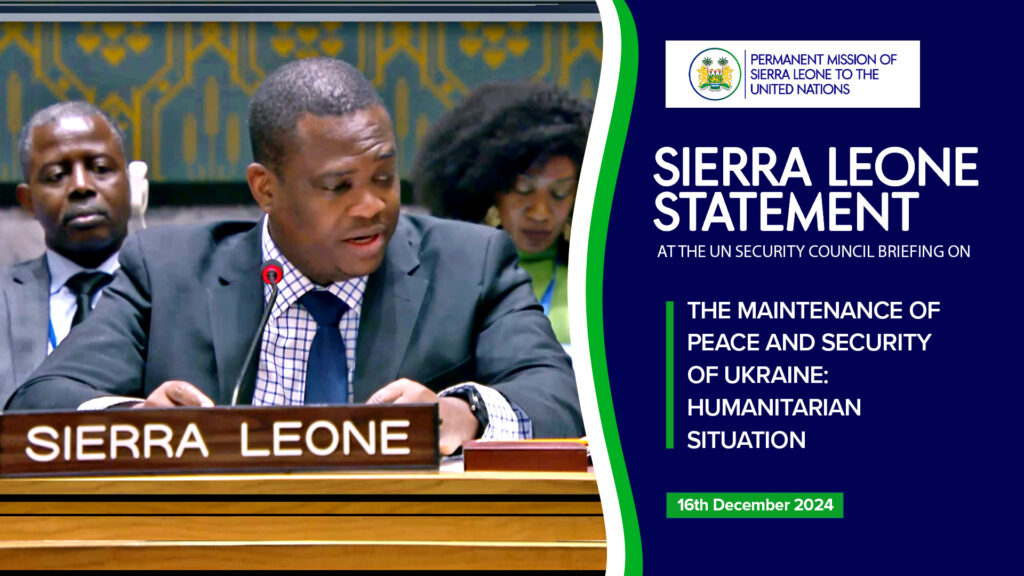STATEMENT BY
H.E. MR. ALAN E. GEORGE
POLITICAL COORDINATOR
Thank you, Madam President.
- I would also like to thank Ms. Lisa Doughten, Director of the Financing and Partnerships Division of the Office for the Coordination of Humanitarian Affairs (OCHA), for her briefing.
- Nearly three years have passed since the onset of the conflict in Ukraine, and the heavy bombardments and airstrikes continue to cause civilian casualties and widespread destruction. Homes, schools, hospitals, and vital civilian infrastructure, including energy systems, have been severely damaged, leading to an ongoing and dire humanitarian crisis.
- As we enter yet another winter season in Ukraine, Sierra Leone underlines the critical need to address the impact of the conflict on Ukraine’s infrastructure, particularly its energy systems, and the immense challenges this poses for civilians during the winter months.
- According to the Wilson Center, Ukraine is facing a severe energy crisis this winter, exacerbated by attacks on its energy infrastructure in March, April, and August 2024. With a peak demand of 18 GW on freezing days (-10°C/14°F), only 12-13 GW will be available, and even with 1.7 GW of potential imports from Europe, there remains a significant shortfall. Daily blackouts could last 10-12 hours, with the situation worsening due to further attacks. These prolonged outages will strain critical services, including water supply, placing lives at risk.
- The extreme cold this winter will further exacerbate the toll on the population and put tremendous pressure on an already overstretched healthcare system. The lack of heating, electricity, water, and gas will make daily life unbearable, particularly in high-rise buildings that rely on electricity for elevators and water pumps. This may trigger a renewed wave of internally displaced persons (IDPs) and refugees, as some areas of Ukraine could become uninhabitable.
- It is reported that Ukraine’s energy infrastructure has been regularly targeted since the start of the conflict in 2022, with significant damage to substations, power plants, and transmission lines. The occupation of the Zaporizhzhia nuclear power plant alone has reduced Ukraine’s power generation capacity by 6 GW.
Madam President,
- The extent of the damage to Ukraine’s energy infrastructure is stark. Since 2022, 18 Combined Heat and Power (CHP) plants, 800 heating facilities, and critical gas storage systems have been damaged. In 2024 alone, over 400 missile and drone strikes have targeted energy sites, including 7 thermal plants, 4 hydroelectric plants, 17 substations, and a gas storage facility, resulting in a 9 GW loss in capacity. By August 2024, nearly 50% of energy facilities were offline, requiring an estimated $1 billion for repairs. A major attack in August left 8 million households without power, marking Kyiv’s first blackout since 2022.
- Sierra Leone is deeply concerned about the devastating impact this continued targeting of energy infrastructure has had on the provision of essential services to Ukrainian civilians. The International Energy Agency (IEA) reports that Ukraine faced a significant power deficit over the summer of 2024, when generation capacity fell 2.3 GW short of peak demand, despite electricity imports from neighboring countries.
- This summer deficit led to daily power cuts across Ukraine, disrupting daily life and economic activity. While citizens showed resilience in the face of these hardships, the lack of electricity for essential facilities such as elevators and water pumps made life increasingly difficult. The full effects of the energy crisis were partially masked by warmer weather, but as winter sets in, the situation is expected to worsen.
- Sierra Leone echoes the IEA’s assessment that Ukraine’s energy infrastructure is extremely fragile heading into this winter season. Despite ongoing repair efforts, much of the lost capacity may not be recoverable, and the pace of repairs may not keep up with the scale of new damage from further attacks.
- We are deeply concerned that further destruction of energy infrastructure will exacerbate the challenges civilians face this winter. According to OCHA’s report from 30 October 2024, this winter is expected to be the most difficult for Ukrainians since the conflict began in February 2022. The harsh winter, which can last up to six months, brings temperatures that can drop as low as -20°C, with an average range between -4.8°C and 2°C. All regions of Ukraine experience temperatures below -10°C during the winter months.
- To address these winter-specific needs, the humanitarian community has launched the 2024-2025 Winter Response Plan, appealing for $492.1 million to assist 1.8 million people with critical winter-related support. Sierra Leone calls on the international community to support this plan.
Madam President,
- In light of the devastating impact on civilians, Sierra Leone calls on all parties to the conflict to adhere to their obligations under international law, including international humanitarian law, and to protect civilians and civilian infrastructure, particularly energy facilities. We urge all parties to prioritize the protection of critical infrastructure to prevent further harm and ensure the restoration of essential services for the well-being and stability of the civilian population.
- We reiterate our call for immediate steps towards a cessation of hostilities and for the parties to engage constructively in good faith to find a political and diplomatic solution that respects the sovereignty and territorial integrity of Ukraine within its internationally recognized borders.
I thank you.



